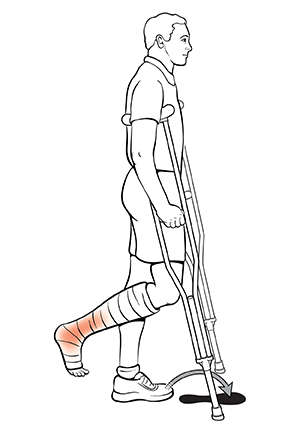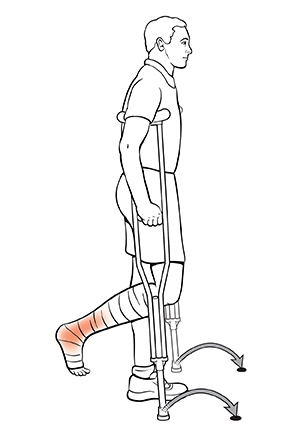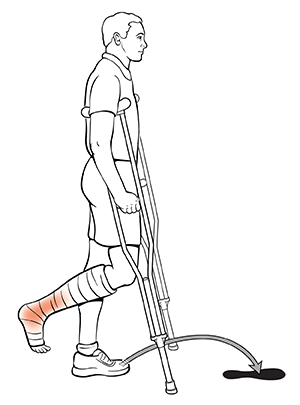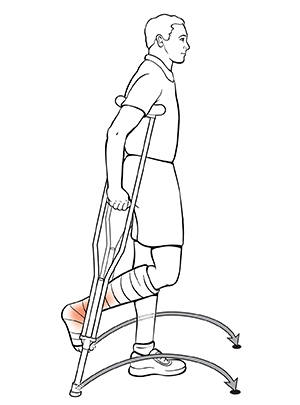A
B
C
D
E
F
G
H
I
J
K
L
M
N
O
P
Q
R
S
T
U
V
W
X
Y
Z
Click a letter to see a list of conditions beginning with that letter.
Click 'Topic Index' to return to the index for the current topic.
Click 'Library Index' to return to the listing of all topics.
Discharge Instructions: Using Crutches (Non-Weight-Bearing)
Your healthcare provider has prescribed crutches for you. A healthy leg can support your body weight. But when you have an injured leg or foot, you may need to keep weight off it. The swing-to method of walking (gait) is easy to learn. It also takes less arm strength and balance. The swing-through gait takes more practice. But it moves you farther with each step and is less tiring overall. Start with swing-to and move on to swing-through when instructed.
Before you use crutches
Be prepared:
-
Remove throw rugs, electrical cords, and anything else that may cause you to fall.
-
Arrange your household to keep the items you need handy. Keep everything else out of the way.
-
Find a backpack, fanny pack, or apron, or use pockets to carry things. This will help you keep your hands free.
Standing with crutches
Use the balanced standing (tripod) position when you start or end a movement. Also use it whenever you’re standing for a length of time.
-
Move your crutches in front of you about 12 inches.
-
Hold the injured (or weaker) foot off the floor.
-
Find your balance.
-
Don't rest your armpits on the pads of the crutches.
Walking with crutches
Tips include:
-
Start in a balanced standing (tripod) position.
-
Squeeze the crutch pads against the sides of your chest.
-
The bottom tips of the crutches should be wide enough apart for you to move easily between them.
-
Support your weight on your hands, not on your armpits.
Swing-to gait
-
With your crutches in front of you, press down on the hand grips.
-
Lift your good (stronger) foot and swing your body up to the crutches.
-
Land on your good foot, between your crutches.
-
Keep the knee of your injured or weaker foot slightly bent.
-
Reach forward and out with the crutches to begin the next step.


Swing-through gait
-
With your crutches in front of you, press down on the hand grips.
-
Lift your good (stronger) foot and swing your body through the crutches.
-
Land on your good foot, about 12 inches in front of the crutches.
-
Keep the knee of your injured leg slightly bent.
-
Reach forward and out with the crutches to begin the next step.


Follow-up
Make a follow-up appointment as directed by your healthcare provider.
When to call your healthcare provider
Call your healthcare provider right away if you have any of the following:
-
Sudden or increased shortness of breath
-
Sudden chest pain
-
Fever above 100.4°F (38.0°C), or higher, or as advised by your provider
-
Chills
-
More redness, soreness, or swelling at the incision site or in the injured leg or foot
-
Drainage from the incision or injured leg or foot
-
Opening of the incision or injury
-
Localized chest pain with coughing
Online Medical Reviewer:
Stacey Wojcik MBA BSN RN
Online Medical Reviewer:
Thomas N Joseph MD
Online Medical Reviewer:
Trina Bellendir PT
Date Last Reviewed:
2/1/2022
© 2000-2025 The StayWell Company, LLC. All rights reserved. This information is not intended as a substitute for professional medical care. Always follow your healthcare professional's instructions.